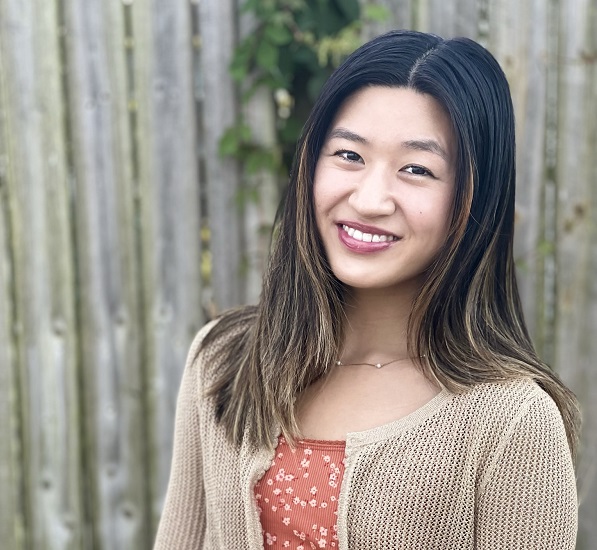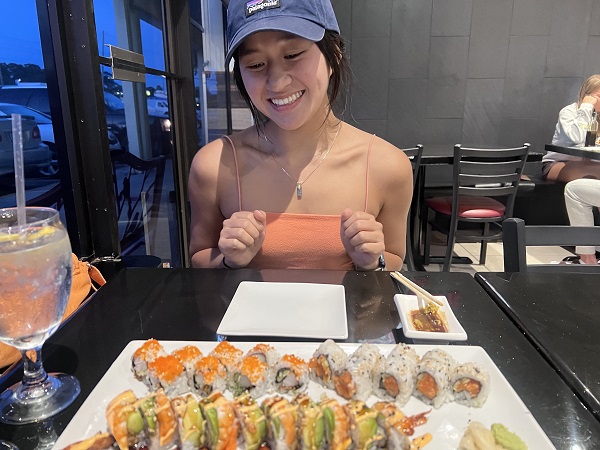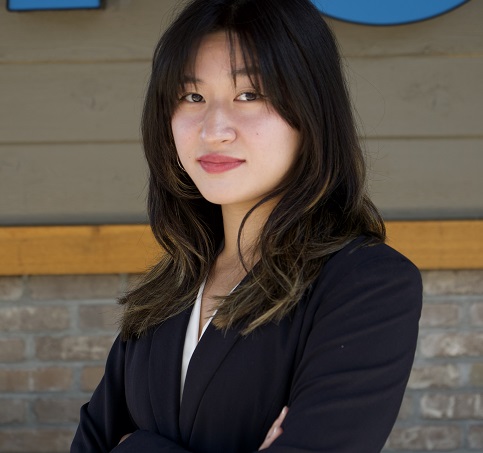
Like most college students, Anna Peterson didn’t know what she wanted to do with her career. She’d switched majors several times, but still couldn’t find a career path that intrigued her.
“Every time I switched majors, I felt uncertainty,” says Anna. “I never felt comfortable committing myself until I discovered product design.”
While a rising junior at the University of Florida, she attended an info session on product design careers given by Meta’s campus outreach team. She’d finally found her calling.
“During the presentation, they kept saying, “Product designers humanize technology.” That struck a chord with me,” Anna recalls. “I love creativity, design, and technology. I didn’t want to learn how to code, but I had a deep respect for technology and how it advances our society as a whole.”
Unfortunately, her university didn’t offer a UX design major, so she earned a degree in advertising with the intention of enrolling in a bootcamp. Luckily, USF had recently partnered with Springboard to offer three new digital skills bootcamps through USF’s Office of Corporate Training and Professional Education. After completing the Springboard-USF UX/UI Design Bootcamp, Anna landed two job offers. She is now a UI/UX designer at Thumbstopper.
During the Meta presentation, the speaker kept saying, “Product designers humanize technology.” That struck a chord with me. Then I discovered this career path where your entire job is to solve problems using empathy.
One job offer was for a graphic design/web developer role with the Department of Health for the state of Florida, and the other was for a UI/UX design role at a startup company. The job I chose had a much more competitive salary and the job responsibilities were exactly what I sought out when I chose to complete the bootcamp. I chose the job that allowed me to develop as a UI/UX designer.
Every day, I open Figma, I start working on new projects or ticket enhancements, or answer questions from the dev team. I answer their questions when they need to add or remove certain features.

One of the biggest selling points was the career resources. A lot of UX/UI designers are self-taught. The hard part is breaking into the industry and getting your first job. After I completed the bootcamp, I spent a lot of time talking to career coaches and following their instructions. Springboard gives you six months of access to the career coaches after you complete the bootcamp, and they’re the ones who point you in the right direction to land a job.
I’m a very type-A person who loves rules and checklists. They advised me to do a networking audit every week. That means reaching out to at least 50 strangers on LinkedIn who were in my area. All you have to do is tell them you’re trying to break into UI/UX design and ask if they can chat with you for 15 minutes. You would be surprised at the number of people who say yes, and those who are willing to meet with you again or even mentor you.
I know networking is uncomfortable because you feel like you’re this annoying little rascal who’s bothering everyone, but no. If you’re bothering them, they won’t respond, and it’s out of sight, out of mind. You will forget you even messaged them.
The experience of constantly talking to strangers prepared me for the job interview. Some days, I’d have three informational interviews plus two job interviews. I got so comfortable telling my story, giving my elevator pitch, and describing who I am and where I’m trying to go. The job interviews were essentially the same conversations over and over, but now I have more confidence in what I’m saying, and that’s the type of energy employers like to see.

My career coach was the single most valuable resource. She made the greatest contribution to my success story. She was the one who taught me how to network. She even provided me with the messaging for my outreach. She provided me with a document with every scenario of all the things you could say. It helped take the anxiety out of networking.
You have to believe that you belong here and you deserve to be talking to these people, interviewing for jobs, and landing job offers. The more you believe in yourself, the more employers will believe in you.
I created a skincare routine builder app. The project reflected pain points I felt in my own life. Lots of people have a collection of skincare products but don’t know how to use them, so they get forgotten. Skincare is also very science-driven, but there’s a lot of false information, unfortunately.
When I started meeting people through LinkedIn, they would always ask, “What are you currently working on?” My mentor advised to always have a project in progress so I would be able to discuss it during informational interviews and job interviews. They were very impressed by my proactivity and commitment to keeping my design skills fresh.
If you no longer feel inspired or challenged, that’s when you should consider switching careers. But if you dread going to work and you have this sinking feeling at the thought of it, that’s a powerful physical indicator that something is wrong.
I feel very passionately about everything that I'm saying because now I know that making a career change is not impossible. You have to know it inside. The moment you start doubting yourself, that’s when it becomes impossible.





